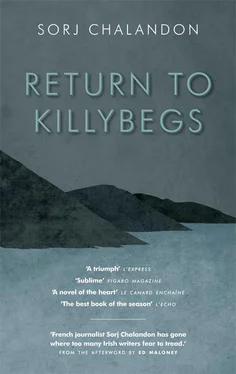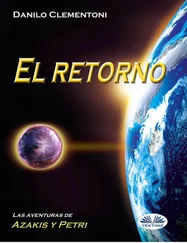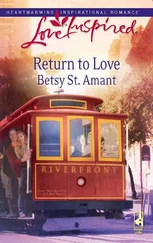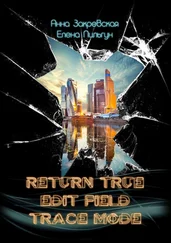— Very funny, Danny groaned.
There were around fifty of us lying behind the hedges, backs against black trees, or creeping over the frozen earth. Danny was bleeding, his face lacerated by the thorns. I threw him a sympathetic glance.
— Take a look at your own face, he growled.

It was four in the morning. We were about to attack the RUC station at Lisnaskea in County Fermanagh. At nightfall, a young Enniskillen priest had blessed our troops. Rome was threatening us with excommunication, but our priest forgave us our trespasses. We had gathered around him, on the bog, in the wind, one knee on the ground and our hands on the freezing wood of our guns. We were wearing civilian clothing. No uniforms, not even a flag. Coats, caps, waterproofs, woollen pea coats and city shoes. We looked more like militia than an army, or, rather, like our fathers during the Civil War.
Each óglach had to watch his partner’s back. Danny and I were covering each other. The explosives manufacturers had just placed four bombs against the wall of the barracks. We were with them. We had dived into the thorns after coming back to get under cover.
It was 14 December 1956. Two days previously, the IRA had launched its ‘Border Campaign’. Coming from the Free State, Republican units were striking British targets in Northern Ireland, then withdrawing across the border again. For the first time since 1944 we had taken up arms. Certain Belfast combatants were also deeply involved in the campaign.
— Open your mouths and lower your heads, our officer ordered.
The explosions were terrible. I was deafened. I grabbed Danny. Everything was flying around us — concrete, wood, tiny projectiles that whistled past like bullets. We didn’t have to go into the building, just strike it.
— Into position!
Alarm behind the walls. A whistle being blown, a siren, shouting. I lay down with my elbows on the ground and my cheek against the butt of my gun. It was a Mauser Karabiner 98K rifle. I’d tried it out during training, but never in combat. Each combatant had three magazines of five rounds. There was clearly no question of besieging them; we were simply announcing our return to combat. I shot my first bullet at nothing. A human shadow, perhaps. I was unsteady. I hated the sniper stance. Stomach pressed against the ground, the shock of the discharge against my shoulder, the crash against my cheek, a pain in my ear. I stood up.
— What are you doing? roared a comrade.
I shot four times, straight ahead, standing with my legs apart like during drills. I aimed at the moving chaos, the confusion facing us. I reloaded. I was thinking of nothing. Gut empty, head empty. Just the powder and the din.
— Get back on the ground, Meehan!
Danny came up to my level, standing, like me. A third got up in turn. I saw nothing. I made my weapon heard. We were shooting at the same time, calmly. When they returned fire, Danny dragged me to the ground. The police were firing back aimlessly. Lead wasps flew overhead. I engaged my last magazine. And then we suddenly heard the terrible voice of the Browning. Steel detonations, staccato, dry, violent.
— Look out, machine-gunfire! Fall back, ordered our captain.
We had no casualties, only the wounds Danny and I had received from the thorns. Our unit crossed back to the Republic just before daybreak. We were ordered to surrender without fighting if we were intercepted by the Irish army. The IRA Army Council had decided that our bullets were for the British enemy, not for our brothers from the Free State.
Across the border, at the edge of the village, a coalman’s truck was waiting for us. We gave back our weapons. I handed mine over with regret. A soldier is nothing without his gun, just a defeated man. Two men wrapped them up in black blankets and buried them under the coal.
Around us, the first of the early-rising residents were appearing. They lowered their eyes when they passed. No enthusiasm, but no hostility, either. I found neither the Belfast winks nor the wide-open doors. For many Irish from here the war had been over for more than thirty years. If it continued in the North, ‘on the other side’, it was none of their business.

Some members of the unit left for home on foot across the fields. They were farmers, local men. Others had left their bicycles in ditches. Two got into the truck, guns at their belts. The officer gripped our hands, Danny’s and mine. He wasn’t in any hurry. He wanted to show us that he had nothing to fear. That in this region, the Republic was sovereign. That’s when two gardaí appeared at the church corner. They spotted us. One stopped the other with his arm. Without a word, they turned on their heels and left unhurriedly.
— We’re not chasing you away, I hope? the IRA captain asked them out of earshot.
He laughed. A car arrived and he got in with four others. With his hand on the open window he shouted, ‘ Éirinn go Brách! ’
I shuddered. The last time I’d heard that cry was when Padraig Meehan had beaten George, old McGarrigle’s donkey. I was a child. I had been ashamed of my father, ashamed of that ‘Ireland Forever!’ And yet here I was today and it was my whole life.
Danny and I went back to Belfast by bus. We crossed the border separately. I hated the first British flag that appeared on the road, planted in a winter garden. I hated the Christmas decorations twinkling mockingly behind the white curtains of wealthy homes. I looked at my frozen country. Its beauty. Its misfortune.
I felt nothing. I was exhausted. I dozed. I wondered whether I had killed anyone during the attack. I was prepared to die, but not to kill. I hoped never to have to look a dead man in the face. I was on borrowed time. A victim on borrowed time, an assassin on borrowed time. That was really what we all were, every one of us. And I was very aware of it.

I was interned on 16 May 1957, at thirty-two years of age. Arrested along with hundreds of other nationalists from both sides of the damned border. Once again without evidence, without trial, and without so much as the hope of a conviction.
There were three of us in my cell at the Crum. British prisons no longer had the space for solitary confinement. The hygiene was beastly, the food excremental. We had no way of knowing whether we were there for a month or for ten years, imprisoned temporarily or locked up for life. So the weakest gave themselves up — the oldest, those without hope. In exchange for an anticipated release, around a hundred of our group renounced violence. Seánie was one of those. Captain Seán Meehan, my brother. He had been damaged by the battles, by prison. He didn’t like the socialist murmurings that had been running through the ranks since the end of the war.
— I’m an Irish patriot, not a communist! he would respond when we used to dream about a different country.
He no longer believed in our path. He said the IRA was a mosquito vainly circling a lion. He even ridiculed our weapons.
— Three men to a gun? We’ll go far with that!
He wasn’t afraid, that wasn’t it. He’d refuse to lift his arms up during searches and spit in the screws’ faces, not allowing them the satisfaction of seeing his pain when he was beaten. He was simply tired. He was letting go of the burden of our Republic. He didn’t want to be involved in any more combat. He was laying down arms. There had been Malachy Meehan, our grandfather, a member of the Irish Republican Brotherhood who was killed by the British in 1896. And then Padraig Meehan, our father, dead from having lost a war. And then him, Seánie Meehan, and me, Tyrone Meehan. And who would be next? Who else would fill English prisons or die from a bullet shot from an English gun? Niall Meehan? Brian Meehan? Wee Kevin Meehan? Why not go ahead and offer up baby Sara?
Читать дальше













